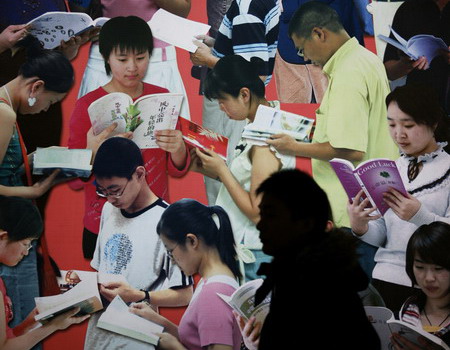Photos
The writing is on the wall
Updated: 2010-12-13 09:23
By Yang Ning and Ben Yue (China Daily)
|
 |
|
An advertising billboard in a street in downtown Beijing showing hundreds of people enjoying a free-reading moment at a recent book fair in Beijing. Seeing great potential in China's publishing market, private publishing businesses have been gearing up their development since last year, when there was a turning point for private publishers prompted by a new policy from the General Administration of Press and Publication (GAPP) that encouraged private enterprises to play a bigger role in the country's publishing business. [Photo / China Daily] |
BEIJING - The old Chinese song Wild Lily Also Has Its Spring perfectly describes the current situation of China's private publishers.
As the lyrics state, it's not only things that are carefully nurtured that can bloom.
It was common parlance among publishers 10 years ago to describe the private publishing industry system as not having much of a future.
However, now, according to data from the Chinese Academy of Social Sciences, more than 90 percent of best-sellers are produced by private publishers. In 2009, China's book market, excluding text books, provided some 300,000 works, with one-third coming from private publishers, People's Daily reported.
Some private booksellers have become millionaires over the years.
Shen Haobo, president of China's biggest private publisher, Beijing Motie Book Ltd, which sold 10 million copies of Stories of the Ming Dynasty over the past two years, was a pioneer poet 10 years ago. His company generated sales revenues of some 500 million yuan ($75.76 million) in 2009.
Another legendary figure, Liaoning Wanrong Book Ltd's manager Lu Jinbo, was once a top writer, penning works under the pseudonym Li Xunhuan in 2000.
Lu's company created the Chinese writers' Real Madrid Club, signing top writers such as Han Han, Wang Shuo, Murong Xuecun, Shi Kang and Annie Baby, all of whom guarantee good sales.
Turning point
The past two years have witnessed a turning point for private publishers.
According to two official guidelines issued by the General Administration of Press and Publication (GAPP), China's publishing industry regulatory body, in January 2010 and April 2009, China encouraged private enterprises to play a bigger role in the publishing business.
Private enterprises are allowed to publish books on science, economics, arts and children's books in cooperation with, or as a unit of, State-run publishers.
"This is the right direction for China's publishing industry. The participation of private publishers will be a strong driver for the industry's revolution," said Zhou Xuelin, president of private-owned China Europe International Business School Publishing Group in Shanghai.
Before these changes, private publishers had to practice under "gray areas" and faced lots of limitations on what they could and could not bring to the market. Laws governing book publishing were unclear.
More than 10 years ago, private publishers were referred to as "bookmongers" because they earned their profits from selling books wholesale. As they became bigger, they began to encroach on territory previously occupied by State-owned publishing houses.
Every book published is given what is called a serial code. State-owned publishers receive this free of charge but private publishers were obliged to pay State-owned publishers 20,000 yuan for each one a decade ago, although the practice was not strictly speaking legal. The price now is reported to be 50,000 yuan.
Private publishers now provide content, book cover designs and promotional activity, gradually taking on the role of book contractors.
"Now, under the new system, private publishers are fully legitimate and can play a more active role. At the same time, their operations are under government regulation and management, which is good for the entire publishing industry," said Zhou.
E-paper

Ear We Go
China and the world set to embrace the merciful, peaceful year of rabbit
Preview of the coming issue
Carrefour finds the going tough in China
Maid to Order
Specials

Mysteries written in blood
Historical records and Caucasian features of locals suggest link with Roman Empire.

Winning Charm
Coastal Yantai banks on little things that matter to grow

New rules to hit property market
The State Council launched a new round of measures to rein in property prices.




